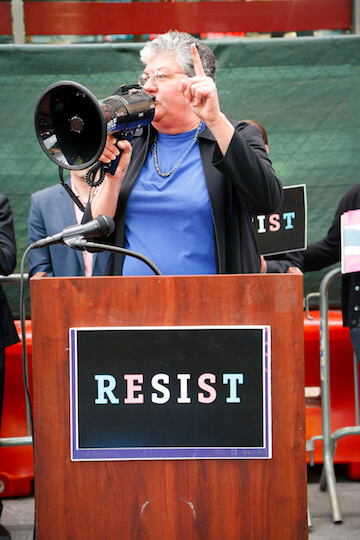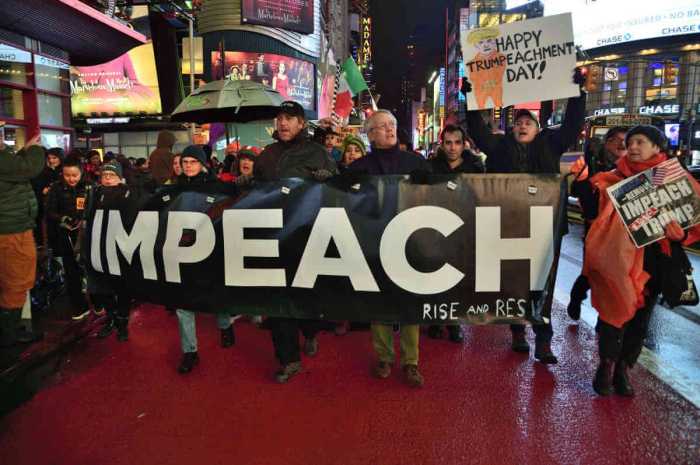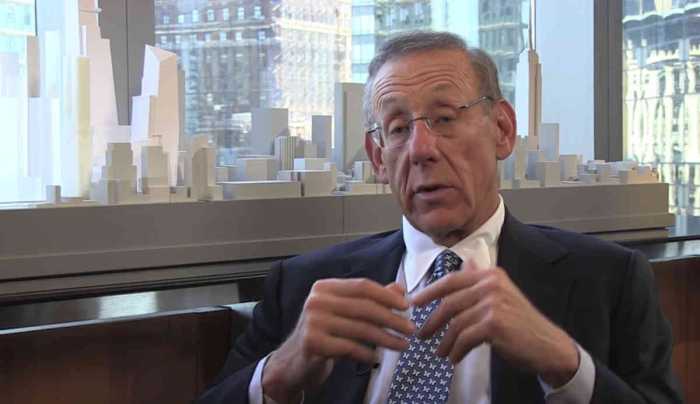Staten Island transgender activist Bryan John Ellicott addressed a July 26 Times Square protest rally. | CHRISTIAN MILES
BY PAUL SCHINDLER | The very first reaction to President Donald Trump’s July 26 early morning announcement about transgender military service was alarm. In a three-part tweet, the president began with the phrase, “After consultation with my Generals and military experts, please be advised that the United States Government will not accept or allow…….” It was another nine minutes until he continued that thought, and numerous reports indicate that Pentagon officials held their breath waiting to see what might come next from their impulsive commander-in-chief.
When it became clear that Trump was unexpectedly reversing a 2016 policy aimed achieving full open service for the up to 6,600 transgender military personnel as well as future recruits, prominent conservative congressional Republicans were among the first critics. One of the Capitol Hill’s leading authorities on the military, Senator John McCain, who chairs the Armed Services Committee, criticized Trump’s abrupt policy shift offered without any explanation, saying, “The president’s tweet this morning regarding transgender Americans in the military is yet another example of why major policy announcements should not be made via Twitter.”
Orrin Hatch, a conservative Senate veteran from Utah, told USA Today, “Transgender people are people, and deserve the best we can do for them. I look forward to getting much more information and clarity from our military leaders about the policy the President tweeted today.” The Des Moines Register quoted a spokesperson for Iowa Senator Joni Ernst, a 20-year military veteran, as saying though she does not support the military paying for gender reassignment procedures that “Americans who are qualified and can meet the standards to serve in the military should be afforded that opportunity.”
The crowd massed near the armed forces recruiting station in Times Square on July 26. | CHRISTIAN MILES
Arguing that transgender Americans already serve in the military and that “excommunicating” them only “weakens our readiness,” Gregory T. Angelo, president of the Log Cabin Republicans, said, “This smacks of politics, pure and simple.” Trump’s tweets came on a week when he’d been panned for a partisan and also sexually suggestive speech to the Boy Scouts’ annual Jamboree, he was facing criticism from right-wing media for his repeated public humiliation of Attorney General Jeff Sessions, and the Senate was hurtling toward rejection of his hopes for Obamacare repeal.
An ironic staple of the reporting that followed Trump’s surprise announcement was a fact uncovered by the Military Times newspaper — that the nearly $42 million the armed services spends on erectile dysfunction medications is more than five times the high end of a Rand Corporation estimate of what transition-related medical expenses would be.
Army Captain Sue Fulton, who leads Spart*a, also spoke on July 26. | CHRISTIAN MILES
Democrats, of course, were harsh in condemning Trump’s posture. New York Senator Chuck Schumer, the Democratic minority leader, said, “We must be clear-eyed about the threats to our civil rights and unified in opposition to any and every attempt to erode them. I will fight tooth and nail against any policy that discriminates against these patriots and erodes the capability of our military.”
Nancy Pelosi, the House Democratic leader, cited the ironic historical significance of the day Trump opted to announce his transgender military position. “On this very day in 1948, President Harry Truman signed the executive order desegregating the US military,” she said in a written statement. “Sixty-nine years later, President Trump has chosen this day to unleash a vile and hateful agenda that will blindside thousands of patriotic Americans already serving with honor and bravery… This morning’s tweets reveal a President with no loyalty to the courageous men and women in uniform who risk their lives to defend our freedoms.”
On PBS’ NewsHour that evening, retired Lieutenant Commander Brynn Tannehill, a transgender woman who is a former Navy pilot and advocacy director of Spart*a, an LGBTQ military organization, described the president’s action as “fairly shocking. This is something we didn’t see coming.” Saying that Defense Secretary Jim Mattis had supported the Obama administration’s decision last year to formally open the military to transgender service — despite his June 30 delay for six months in final implementation to assess the policy’s impact on “readiness and lethality” — Tannehill argued that for the thousands of transgender service members now serving openly, the sudden fear they might be discharged is “highly disruptive and damaging to people who just want to serve their country.”
The military recruiting station in Times Square, on the evening of July 26, became the venue for the first of a series of New York protests against the Trump announcement. The large crowd, that included many elected officials and LGBTQ activists like retired Army Captain Sue Fulton, an out lesbian West Point graduate who now leads Spart*a, marched from Times Square to the Trump International Hotel at Columbus Circle and then to Trump Tower on Fifth Avenue.






































